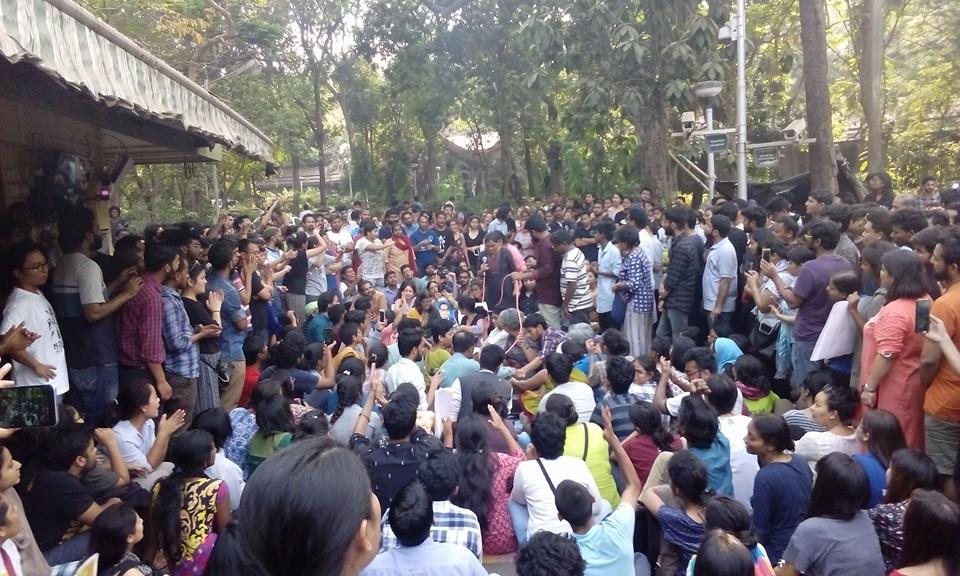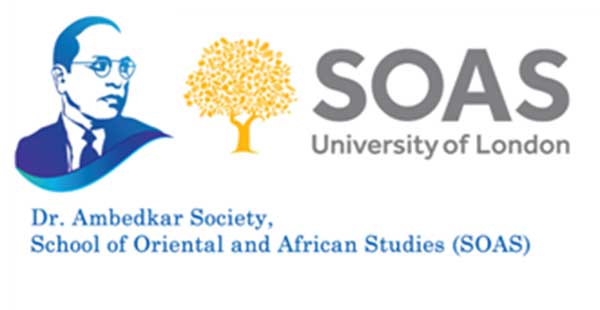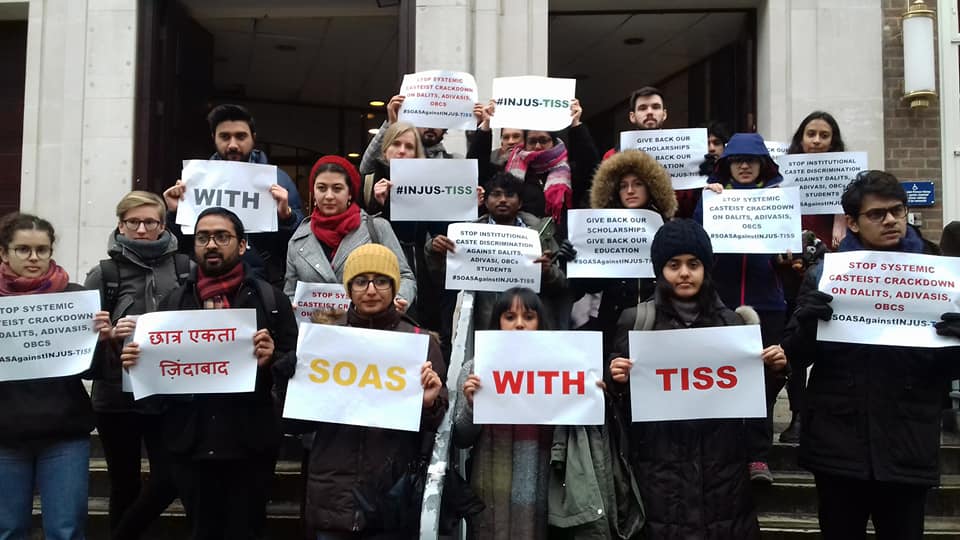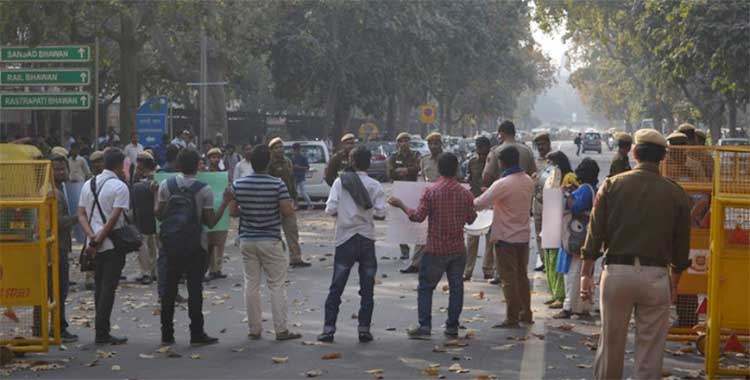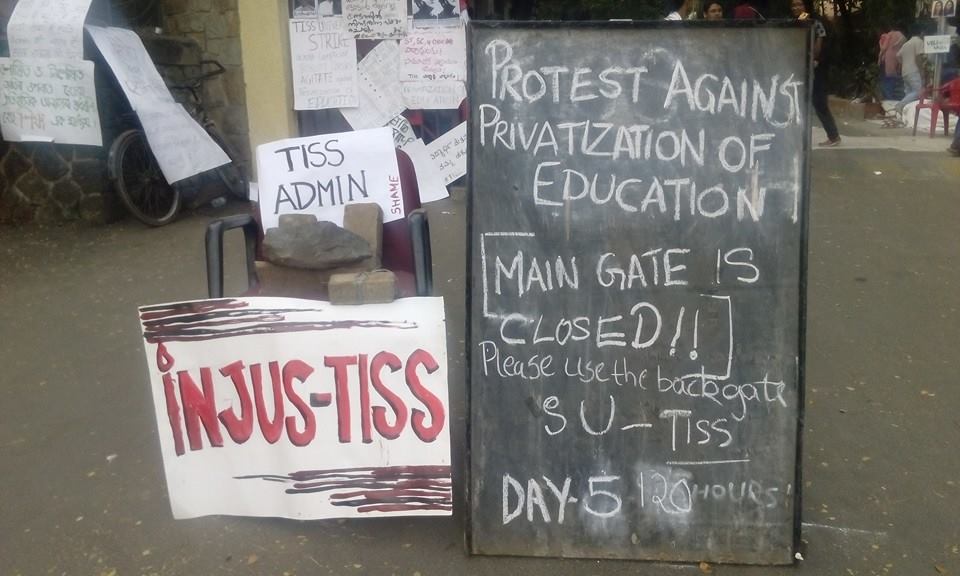
When I joined Tata Institute of Social Sciences (hereon TISS) in 2014 to pursue Masters in Development Policy, Planning and Practice from its Tuljapur campus, one thing which struck me was the considerable number of students coming from lower class and caste background or from other marginalized communities unlike many other ‘elite’ social sciences Institutions in India. As I hailed from the state of West Bengal where caste antagonism has got subdued (not annihilated) due to many historic reasons and also because of enjoying the privileges of a middle class upper caste male, one’s vision gets restrained from seeing the structural inequalities and injustices. But the campus provided me and many others like me with this unique space of interaction which eventually leads to unlearn one’s biases and to understand the society and state through the day to day life struggle of those students- and then instigates one to do something about it within her own limitation and capacity.
This space created by the students-faculty and also nurtured by the institution used to create dialogues leading to transform people- I have seen students who at the beginning of their courses might have argued against the affirmative actions (from their privileged positions, of course) taken up by TISS for the students of ‘marginalized’ classes and communities- but after spending a year in the campus, have taken 180 degrees turn. Because by then, that space of dialogue has been able to imbibe a core value into the students which was very loud and clear in saying that a society can only be truly democratic and progressive if the people and the institutions take responsibility to undo the inequalities and injustices perpetrated for thousands of years while the state has to be held liable for that. Not only by stringently following the reservation policy, but through initiatives such as organizing free coaching classes by students and faculty before TISSNET especially for the school students of marginalized communities coming from regions like Bidarva, to maintaining financial support mechanism for the needy students during field research- were some of the many. But since 21st February, we are experiencing a students’ strike around the four campuses of TISS as the students are protesting against the exclusionary policies introduced by the same institution. What results in this turn around?
By now, anyone following the TISS students’ protest would know that the students have kept the following demands:
1) Retraction of TISS administration’s notification about rolling back of the financial aid system (tuition, dining hall and hostel) for GOI-PMS students of 2016-18 and 2017-19 batches
2) Exemptions of DH and hostel fees for the students of BA/MA integrated programme of the Off campuses of 2015 onwards
3) Symbolic representation of office of SPO from ST/SC OBC category.
So in a nutshell, when TISS administration has tried to put an end to the financial support system for the students coming from marginalized communities, the students have resisted and the situation is still unfolding since then. But if someone closely inspects the charter of demands put forth by the students as well as the slogans coming forth through the ongoing protest, a bigger picture comes out.
Since the RSS-BJP government has come in power, it has not left any opportunity to express its utter disregard towards democratic processes, demands and voice of dissent. Moreover, the Manuvadi forces present in the governing classes have been trying to align the country as per their dream of ‘Hindu-rastra’. While the congress government under pressure of people’s movements all around India, tried to balance between the corporate-capital led neoliberalism and people’s resistance through introducing various social welfare policies as means of ‘governmentality’, the RSS-BJP government came along with unabated privatization and corporate loot. So from HCU, JNU to now TISS are being targeted not because of the institutions per se but precisely because this autocratic government does not want social sciences to thrive in this country. On the contrary, to ensure its own existence, it needs to get reed of the praxis and critical consciousness which Social Sciences carries along and propagates.
So when we see institutions like TISS going through fund crunch as MHRD is more concerned about funding research on Cow and Cow products rather than funding the research scholars of different streams of science and social sciences, when departments like women studies had to be closed down or are barely kept open in many universities with no surety of funds, when fees are hiked abruptly and financial aids are rolled back- it clearly indicates to the direct result of the neoliberal education policies taken up by the consecutive governments. Because in this policy framework, education is an industry now, students are the commodities and even, consumers.
In the neoliberal education framework which runs as a top down structure, educational institutions are reduced to factories, teachers to managers and students to workers. Franklin Bobbitt, a specialist in educational administration at the University of Chicago, wrote in The Supervision of City Schools: “the worker must be kept supplied with detailed instructions as to the work to be done, the standards to be reached, the methods to be employed and the appliances to be used….Teachers cannot be permitted to follow caprice in method. When a method which is clearly superior to all other methods has been discovered, it alone can be employed. To neglect this function and to excuse one’s negligence by claiming the value of the freedom of the teacher was perhaps justifiable under our earlier empiricism…” Eventually NATIONAL EDUCATION ASSOCIATION (NEA) in 1911, a centralized committee in USA for the standardization of education institutions was established and the main executioner of this project Joseph S. Taylor, superintendent of schools in New York wrote the directives of this new education policy in 1912:
- the state as employer must cooperate with the teacher as employee, for the latter does not always understand the ”science of education”,
- the state provides experts who supervises the teacher and suggest the process that are more economical,
- the task system obtains in the school as well as in the shop, each grade being a measured quantity of work to be accomplished in a given term,
- Every teacher who accomplishes the task receives a bonus, not in money but in the form of a rating which may have money value, those who are unable to do the work or will disagree with the method will be eliminated.
If we compare the above with Lyndoh Commission proposals in 2006, it would be the first to propose similar ‘universal code of conducts’ in education sector in India. The same industrial management approach which was prescribed back in US in 1911 was just copied in the name of education sector reform. And subsequently, it brought rampant privatization of education. Eventually the market started deciding what to learn and what not to, even it starts dictating the pedagogy. Education then remains available only to those who have adequate capital to invest, either monetary or social which is similar to Manuvadi practice of only the Brahmin being allowed to study Sanskrit and worship at temples.
So, when TISS students protest against the upsurge of tuition fees and hostel fees,; when they point out to the year to year decline of enrollment of ST/SC OBC students (see TISS for Everyone @facebook) and increase in drop-out rates of the students from marginalized communities, when they rise up against the administration’s decision of taking away students’ rights of having financial aid- they stand against the very exclusionary model which the Hindutva Brahminical neoliberalism wants to champion. If it can truly transcend the boundary of campus and join the emerging wave of student-youth movement all around the country against the Hindutva fascist forces, it would truly dare to reimagine education, reimagine our future.
Ananyo Short Bio- Tata Institute of Social Sciences, Tuljapur alumni of 2014-16 batch of Development Policy, Planning and Practice. As a student activist, was connected to anti- LPG movements in Singur, Nandigrum, Lalgarh as well as with rights movements of tea-garden labourers in North Bengal. Presently a development practitioner working for PRI strengthening.


